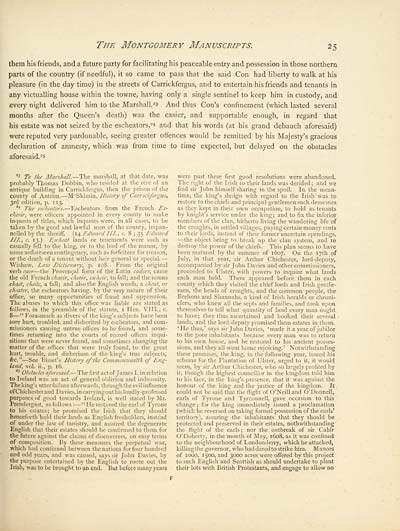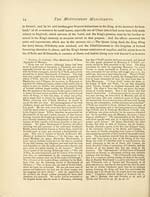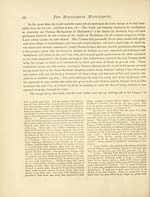Montgomery manuscripts
(39) Page 25
Download files
Complete book:
Individual page:
Thumbnail gallery: Grid view | List view

The Montgomery Manuscripts.
25
them his friends, and a future party for facilitating his peaceable entry and possession in those northern
parts of the country (if needful), it so came to pass that the said Con had liberty to walk at his
pleasure (in the day time) in the streets of Carrickfergus, and to entertain his friends and tenants in
any victualling house within the towne, having only a single sentinel to keep him in custody, and
every night delivered him to the Marshall. 2 3 And thus Con's confinement (which lasted several
months after the Queen's death) was the easier, and supportable enough, in regard that
his estate was not seized by the escheators, 2 * and that his words (at his grand debauch aforesaid)
were reputed very pardonable, seeing greater offences would be remitted by his Majesty's gracious
declaration of amnesty, which was from time to time expected, but delayed on the obstacles
aforesaid. 2 5
° 3 To the Marshall.— The marshal!, at that date, was
probably Thomas Dobbin, who resided at the rere of an
antique building in Carrickfergus, then the prison of the
county of Antrim. — M'Skimin, History of Carrickfergus,
3rd edition, p. 113.
* 4 The escheators. — Escheators from the French Es-
cheoir, were officers appointed in every county to make
inquests of titles, which inquests were, in all cases, to be
taken by the good and lawful men of the county, impan-
nelled by the sheriff. (14 Edward HI., c. 8 ; 35 Edward
III., c. 13.) Escheat lands or tenements were such as
casually fell to the king, or to the lord of the manor, by
some unforeseen contingency, such as forfeiture for treason,
or the death of a tenant without heir general or special. —
Wishaw, Law Dictionary, p. 108. From the original
verb caer — the Provencal form of the Latin cadere, came
the old French chaeir, cheoir, esc heir, to fall; and the nouns
fhaet, cheite, a fall; and also the English words, a cheat, or
cheater, the escheators having, by the very nature of their
office, so many opportunities of fraud and oppression.
The abuses to which this office was liable are stated as
follows, in the preamble of the statute, 1 Hen. VIII., c.
8 — " Forasmuch as divers of the king's subjects have been
sore hurt, troubled, and disherited by escheators, and com-
missioners causing untrue offices to be found, and some-
times returning into the courts of record offices inqui-
sitions that were never found, and sometimes changing the
matter of the offices that were truly found, to the great
hurt, trouble, and disherison of the king's true subjects,
&c." — See b'isset's History of the Commonwealth of Eng-
land, vol. ii. , p. 16.
=s Obstacles aforesaid. — The first actof James I. in relation
to Ireland was an act of general oblivion and indemnity.
Theking's utter failure afterwards, through the evil influence
ofChichesterand Davies, in carry ingout his loudly-professed
purposes of good towards Ireland, is well stated by Mr.
Prendergast, as follows : — "He restored the earl of Tyrone
to his estates; he promised the Irish that they should
henceforth hold their lands as English freeholders, instead
of under the law of tanistry, and assured the degenerate
English that their estates should be confirmed to them for
the future against the claims of discoverers, on easy terms
of composition. By these measures the perpetual war,
which had continued between the nations for four hundred
and odd years, and was caused, says sir John Davies, by
the purpose entertained by the English to roote out the
Irish, was to be brought to an end. But before many years
were past these first good resolutions were abandoned.
The right of the Irish to their lands was derided; and we
find sir John himself sharing in the spoil. In the mean-
time, the king's design with regard to the Irish was to
restore to the chiefs and principal gentlemen such demesnes
as they kept in their own occupation, to hold as tenants
by knight's service under the king; and to fix the inferior
members of the clan, hitherto living the wandering life of
the creaghts, in settled villages, paying certain money rents
to their lords, instead of their former uncertain spendings,
— the object being to break up the clan system, and to
destroy the power of the chiefs. This plan seems to have
been matured by the summer of 1607. On the 17th of
July, in that year, sir Arthur Chichester, lord-deputy,
accompanied by sir John Davies and other-commissioners,
proceeded to Ulster, with powers to inquire what lands
each man held. There appeared before them in each
county which they visited the chief lords and Irish gentle-
men, the heads of creaghts, and the common people, the
Brehons and Shannahs, a kind of Irish heralds or chroni-
clers, who knew all the septs and families, and took upon
themselves to tell what quantity of land every man ought
to have; they thus ascertained and booked their several
lands, and the lord-deputy promised them estates in them.
'He thus,' says sir John Davies, 'made it a year of jubilee
to the poor inhabitants because every man was to return
to his own house, and be restored to his ancient posses-
sions, and they all went home rejoicing.' Notwithstanding
these promises, the king, in the following year, issued his
scheme for the Plantation of Ulster, urged to it, it would
seem, by sir Arthur Chichester, who so largely profited by
it, though the highest councillor in the kingdom told him
to his face, in the king's presence, that it was against the
honour of the king and the justice of the kingdom. It
could not be said that the (light of O'Neill and O'Donnell,
earls of Tyrone and Tyrconnell, gave occasion to this
change ; for the king immediately issued a proclamation
(which he reversed on taking formal possession of the earls'
territory), assuring the inhabitants that they should be
protected and preserved in their estates, nothwithstanding
the flight of the earls ; nor the outbreak of sir Cahir
O'Doherty, in the month of May, 1608, as it was confined
to the neighbourhood of Londonderry, which he attacked,
killingthe governor, who haddaredto strike him. Manors
of 1000, 1500, and 3000 acres were offered by this project
to such English and Scottish as should undertake to plant
their lots with British Protestants, and engage to allow no
25
them his friends, and a future party for facilitating his peaceable entry and possession in those northern
parts of the country (if needful), it so came to pass that the said Con had liberty to walk at his
pleasure (in the day time) in the streets of Carrickfergus, and to entertain his friends and tenants in
any victualling house within the towne, having only a single sentinel to keep him in custody, and
every night delivered him to the Marshall. 2 3 And thus Con's confinement (which lasted several
months after the Queen's death) was the easier, and supportable enough, in regard that
his estate was not seized by the escheators, 2 * and that his words (at his grand debauch aforesaid)
were reputed very pardonable, seeing greater offences would be remitted by his Majesty's gracious
declaration of amnesty, which was from time to time expected, but delayed on the obstacles
aforesaid. 2 5
° 3 To the Marshall.— The marshal!, at that date, was
probably Thomas Dobbin, who resided at the rere of an
antique building in Carrickfergus, then the prison of the
county of Antrim. — M'Skimin, History of Carrickfergus,
3rd edition, p. 113.
* 4 The escheators. — Escheators from the French Es-
cheoir, were officers appointed in every county to make
inquests of titles, which inquests were, in all cases, to be
taken by the good and lawful men of the county, impan-
nelled by the sheriff. (14 Edward HI., c. 8 ; 35 Edward
III., c. 13.) Escheat lands or tenements were such as
casually fell to the king, or to the lord of the manor, by
some unforeseen contingency, such as forfeiture for treason,
or the death of a tenant without heir general or special. —
Wishaw, Law Dictionary, p. 108. From the original
verb caer — the Provencal form of the Latin cadere, came
the old French chaeir, cheoir, esc heir, to fall; and the nouns
fhaet, cheite, a fall; and also the English words, a cheat, or
cheater, the escheators having, by the very nature of their
office, so many opportunities of fraud and oppression.
The abuses to which this office was liable are stated as
follows, in the preamble of the statute, 1 Hen. VIII., c.
8 — " Forasmuch as divers of the king's subjects have been
sore hurt, troubled, and disherited by escheators, and com-
missioners causing untrue offices to be found, and some-
times returning into the courts of record offices inqui-
sitions that were never found, and sometimes changing the
matter of the offices that were truly found, to the great
hurt, trouble, and disherison of the king's true subjects,
&c." — See b'isset's History of the Commonwealth of Eng-
land, vol. ii. , p. 16.
=s Obstacles aforesaid. — The first actof James I. in relation
to Ireland was an act of general oblivion and indemnity.
Theking's utter failure afterwards, through the evil influence
ofChichesterand Davies, in carry ingout his loudly-professed
purposes of good towards Ireland, is well stated by Mr.
Prendergast, as follows : — "He restored the earl of Tyrone
to his estates; he promised the Irish that they should
henceforth hold their lands as English freeholders, instead
of under the law of tanistry, and assured the degenerate
English that their estates should be confirmed to them for
the future against the claims of discoverers, on easy terms
of composition. By these measures the perpetual war,
which had continued between the nations for four hundred
and odd years, and was caused, says sir John Davies, by
the purpose entertained by the English to roote out the
Irish, was to be brought to an end. But before many years
were past these first good resolutions were abandoned.
The right of the Irish to their lands was derided; and we
find sir John himself sharing in the spoil. In the mean-
time, the king's design with regard to the Irish was to
restore to the chiefs and principal gentlemen such demesnes
as they kept in their own occupation, to hold as tenants
by knight's service under the king; and to fix the inferior
members of the clan, hitherto living the wandering life of
the creaghts, in settled villages, paying certain money rents
to their lords, instead of their former uncertain spendings,
— the object being to break up the clan system, and to
destroy the power of the chiefs. This plan seems to have
been matured by the summer of 1607. On the 17th of
July, in that year, sir Arthur Chichester, lord-deputy,
accompanied by sir John Davies and other-commissioners,
proceeded to Ulster, with powers to inquire what lands
each man held. There appeared before them in each
county which they visited the chief lords and Irish gentle-
men, the heads of creaghts, and the common people, the
Brehons and Shannahs, a kind of Irish heralds or chroni-
clers, who knew all the septs and families, and took upon
themselves to tell what quantity of land every man ought
to have; they thus ascertained and booked their several
lands, and the lord-deputy promised them estates in them.
'He thus,' says sir John Davies, 'made it a year of jubilee
to the poor inhabitants because every man was to return
to his own house, and be restored to his ancient posses-
sions, and they all went home rejoicing.' Notwithstanding
these promises, the king, in the following year, issued his
scheme for the Plantation of Ulster, urged to it, it would
seem, by sir Arthur Chichester, who so largely profited by
it, though the highest councillor in the kingdom told him
to his face, in the king's presence, that it was against the
honour of the king and the justice of the kingdom. It
could not be said that the (light of O'Neill and O'Donnell,
earls of Tyrone and Tyrconnell, gave occasion to this
change ; for the king immediately issued a proclamation
(which he reversed on taking formal possession of the earls'
territory), assuring the inhabitants that they should be
protected and preserved in their estates, nothwithstanding
the flight of the earls ; nor the outbreak of sir Cahir
O'Doherty, in the month of May, 1608, as it was confined
to the neighbourhood of Londonderry, which he attacked,
killingthe governor, who haddaredto strike him. Manors
of 1000, 1500, and 3000 acres were offered by this project
to such English and Scottish as should undertake to plant
their lots with British Protestants, and engage to allow no
Set display mode to:
![]() Universal Viewer |
Universal Viewer | ![]() Mirador |
Large image | Transcription
Mirador |
Large image | Transcription
Images and transcriptions on this page, including medium image downloads, may be used under the Creative Commons Attribution 4.0 International Licence unless otherwise stated. ![]()
| Histories of Scottish families > Montgomery manuscripts > (39) Page 25 |
|---|
| Permanent URL | https://digital.nls.uk/95233395 |
|---|
| Description | A selection of almost 400 printed items relating to the history of Scottish families, mostly dating from the 19th and early 20th centuries. Includes memoirs, genealogies and clan histories, with a few produced by emigrant families. The earliest family history goes back to AD 916. |
|---|

